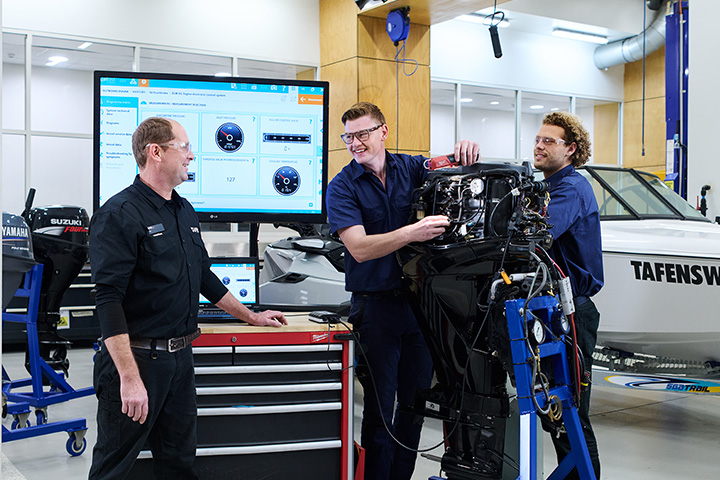Skip to main content
Start quiz
- Go to homepage
- Course areas
- Maritime
- Certificate I in Maritime Operations (General Purpose Hand Near Coastal)
Back to:Maritime
National code: MAR10224
Certificate I in Maritime Operations (General Purpose Hand Near Coastal)

Overview
About this course
If your goal is to work at sea, this entry-level course will help you get started. Qualify to work as a general purpose hand in coastal waters on vessels up to 100 m. Learn to work as part of a crew on deck or in the engine room.
Outcomes
What you'll gain
Learning outcomes
Through a mixture of theory and practical course work, learn to:
work effectively as part of a crew on a vessel up to 100 m
demonstrate critical survival skills in the event of vessel abandonment
understand nautical terminology
apply firefighting skills and basic first aid
apply environmental work practices to protect our waters.
Course outcomes
Learn core skills that prepare you for opportunities in your chosen field.
An entry-level qualification for a career at sea.
The confidence to work as part of a crew, in a support role, on a vessel up to 100 m.
The ability to fight a fire on board a vessel.
The skills to abandon a vessel safely in an emergency.
A clear pathway to higher maritime qualifications.
Suitability
Is this course right for you?
Entry requirements
This course requires evidence of previous experience or study before you can enrol.
You have read requirements for certification as a General Purpose Hand on the AMSA website.
Completion requirements
During your study you'll need to provide your teacher with the following evidence:
Entry recommendations
To be prepared for this course, we recommend that you have:
the physical capacity to learn and perform the duties of a General Purpose Hand (Deckhand) aboard a vessel, including handling lines and ropes to moor a vessel, using deck machinery to anchor a vessel, and assisting with cargo work, shipboard maintenance and engine room tasks
the ability to swim 50 m and stay afloat for 5 minutes without a lifejacket
a resistance to chronic seasickness
the ability and willingness to work in all weather conditions
the capacity to move around a vessel and board survival craft unassisted
the ability to meet minimum medical fitness standards as stipulated for General Purpose Hand on the AMSA website
the ability to complete 5 days of qualifying sea service.
We tailor our courses to meet local community needs, so some campuses may have extra entry requirements. Check your preferred location for details. Need help preparing? Contact us for support.
Find Your Fit
This simple tool guides you to a suitable course level based on your foundation skills and confidence.
Pathways
Future career and study options
Career pathways
Our graduates go onto roles like:
Deck Hand
Deck Hands perform maintenance and lookout tasks aboard ships.
Full-time share Full-time workers usually work 35 hours or more a week (in all their jobs combined).
79%
Employment size Employment size is the number of workers who do this as their main job.
900 workers
Average age This is the average age of all workers in this job.
39 years
Weekly pay Median earnings are shown for full-time, non-managerial employees paid at the adult rate, before tax or any amounts that are salary sacrificed. These figures are a guide to earnings only and should not be used to determine a wage rate.
$1,620
Average full-time The average full-time hours that people in this role work each week.
50 hours
Skill level rating Skill level ratings are based on the range and complexity of job roles. In general, the higher the skill level, the more formal education and training, previous experience or on-the-job training needed to be good at the job.
Lower
Gender share
11% female
Future growth The Department of Employment, Skills, Small and Family Business estimates the likely change in number of workers in this role, or industry, over the next 5 years. Future growth is the likely percentage change compared to all other job roles.
Strong Growth
Other jobs include: engine room assistant.
Licensing
The Australian Maritime Safety Authority (AMSA) sets the rules for each maritime qualification to make sure you’re fully prepared to work in that role. After finishing your TAFE NSW course, you’ll need to apply to AMSA and satisfy any certification prerequisites such as sea time and minimum medical fitness standards. For full details, visit the AMSA website.
Study pathways
Take your study further with other courses offered at TAFE NSW:
Previous study0 Courses
Begin here to gain experience and confidence in this study area.
The Certificate I in Maritime Operations (General Purpose Hand Near Coastal) does not have any pre-requisite courses.
Further study2 Courses
Advance your skills to take your career to the next level
Related study0 Courses
Learn core skills that prepare you for opportunities in your chosen field.
The Certificate I in Maritime Operations (General Purpose Hand Near Coastal) does not have any related courses.
Your experience counts
At TAFE NSW, we recognise your previous study and work experience. You can apply for recognition of prior learning or a credit transfer with any of our courses. If you're successful you'll get your qualification faster.
Units
Units taught in this course
Courses are made up of a combination of both core and specialty units. In the Certificate I in Maritime Operations (General Purpose Hand Near Coastal) qualification, you’ll need to successfully complete 8 units of competency, including 8 core and 0 speciality units.
Please note, not all specialty units are offered at every TAFE NSW location. It is highly recommended that you check with your preferred campus for information about the specialty units offered at that location.
Core units - 8
Core units are central to the job outcomes of a particular industry or occupation. These are the units industry has agreed are essential to be capable and qualified at a particular study level.
Apply basic survival skills in the event of vessel abandonmentMARF060
Meet work health and safety requirementsMARF029
Survive at sea using survival craftMARF030
Provide First AidHLTAID011
TAFE NSW services
Facilities and support
TAFE NSW provides support services across all campus locations and online. Whatever your needs or circumstances, we have the people, resources, counselling and facilities to support you in focusing on your studies.
TAFE NSW Disability Support Service
TAFE NSW Language, Literacy and Numeracy (LLN) support
TAFE NSW Aboriginal Support; Learner support (ABE)
TAFE NSW Careers, Counselling and Pathways Service
TAFE NSW Libraries
Scholarship programs - be supported as you explore your talents and fulfil your potential
Read&Write literacy and study support software is available free for all TAFE NSW students to use while studying on campus and at home
LinkedIn Learning - an online resource which offers innovative courses and tutorials to improve your personal and professional skills
Student associations - get social with our student community
Study options